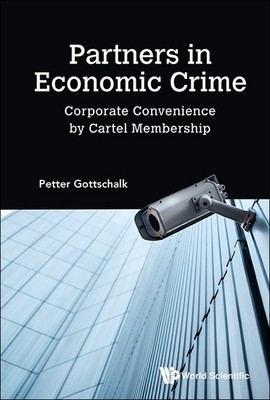
- We will send in 10–14 business days.
- Author: Petter Gottschalk
- Publisher: World Scientific Publishing Europe Ltd
- ISBN-10: 1800617461
- ISBN-13: 9781800617469
- Format: 15.2 x 22.9 x 1.6 cm, kieti viršeliai
- Language: English
- SAVE -10% with code: EXTRA
Partners in Economic Crime: Corporate Convenience by Cartel Membership (e-book) (used book) | bookbook.eu
Reviews
Description
In market economies, companies in the same industry are expected to compete with one another. However, one might ask, 'would it not be more convenient for competing companies to cooperate with each other?' This would certainly seem to avoid threats and allow each company to gain from joint possibilities.By applying the theory of convenience, this book gains insights into the phenomenon of cartels. This theory suggests that there are motives, opportunities, and, crucially, willingness for deviant behavior by corporate executives in many industries. Throughout the book, both the characteristics of cartels and the nature of convenience are explained, supported by presentations and analyses of recent case studies.The central rationale behind this book is to explain the motives, opportunities, and willingness for deviant behavior committed by cartel members. Put simply, you cannot fight something that you don't understand, just as you cannot fight someone that you don't understand. Accordingly, these insights into the cartel phenomenon are supported by convenience analysis, accounting for how corporate executives vary in their convenience orientation and specificity. The target of antitrust enforcement must be reducing the convenience of cartel membership: the opportunities for committing and concealing wrongdoing, and the situations where potential offenders have both the motive and the willingness for deviance.
EXTRA 10 % discount with code: EXTRA
The promotion ends in 23d.18:25:55
The discount code is valid when purchasing from 10 €. Discounts do not stack.
- Author: Petter Gottschalk
- Publisher: World Scientific Publishing Europe Ltd
- ISBN-10: 1800617461
- ISBN-13: 9781800617469
- Format: 15.2 x 22.9 x 1.6 cm, kieti viršeliai
- Language: English English
In market economies, companies in the same industry are expected to compete with one another. However, one might ask, 'would it not be more convenient for competing companies to cooperate with each other?' This would certainly seem to avoid threats and allow each company to gain from joint possibilities.By applying the theory of convenience, this book gains insights into the phenomenon of cartels. This theory suggests that there are motives, opportunities, and, crucially, willingness for deviant behavior by corporate executives in many industries. Throughout the book, both the characteristics of cartels and the nature of convenience are explained, supported by presentations and analyses of recent case studies.The central rationale behind this book is to explain the motives, opportunities, and willingness for deviant behavior committed by cartel members. Put simply, you cannot fight something that you don't understand, just as you cannot fight someone that you don't understand. Accordingly, these insights into the cartel phenomenon are supported by convenience analysis, accounting for how corporate executives vary in their convenience orientation and specificity. The target of antitrust enforcement must be reducing the convenience of cartel membership: the opportunities for committing and concealing wrongdoing, and the situations where potential offenders have both the motive and the willingness for deviance.


Reviews